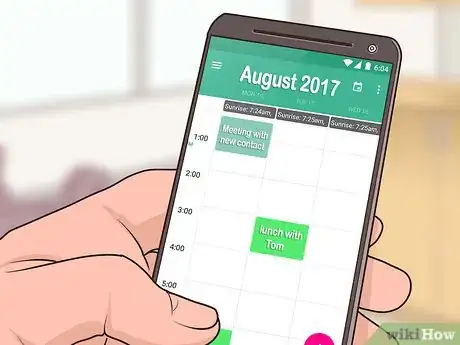This article was co-authored by Tasha Rube, LMSW. Tasha Rube is a Licensed Social Worker based in Kansas City, Kansas. Tasha is affiliated with the Dwight D. Eisenhower VA Medical Center in Leavenworth, Kansas. She received her Masters of Social Work (MSW) from the University of Missouri in 2014.
This article has been viewed 31,311 times.
A dynamic person is often defined by their commitment to self-improvement and helping others. Someone with a dynamic personality will seek to make changes in their mindset when necessary. If you’re looking to become a more dynamic individual, you’re in the right place—we’ll show you how to utilize the resources at your disposal to improve yourself. Whatever your circumstances, you can become dynamic by focusing on education, improving your communication, and being a good role model to others.
Steps
Expanding Your Knowledge
-
1Read for at least half an hour daily. Take 30 minutes daily to learn more about what’s going on in the world around you. Read articles to stay updated on current events or pick up that fiction novel you’ve been wanting to read. Reading helps to expand your vocabulary and knowledge.[1]
- Subscribe to newspapers on your phone.
- Get a library card to check out books for free.
- Don’t worry if it takes you several months to finish a good book. Remember that the goal isn’t about how fast you can read or the amount of books you read, but rather getting into the habit of reading frequently.
-
2Take a class. Consider what being “dynamic” means to you. Is it being more politically savvy? Take a political science class. Or speaking more than one language? Take Spanish, Italian, or Mandarin. Find local classes at a University, community college, or your high school that will help broaden your knowledge on the things important to you.[2]
- Some schools offer classes online for free. Look into these and begin learning!
Advertisement -
3Attend local events. Look for schedules on your city’s webpage for local educational events coming up. Perhaps there is a book signing, workshop, or cultural event that you might enjoy. Research the event before going so that you understand what’s going on.[3]
- For instance, perhaps there is a local Native American tribe hosting a powwow in your county. Research powwow history and etiquette, as well as info about the tribe, before attending.
-
4Visit museums and festivals. If there are museums near you, take advantage of them! Most places offer a museum that focuses on the history of the city, so take some time to learn about where you live. Visit art, history, and science museums, as well.[4]
- You can also find out about local events or festivals from social media.
-
5Listen to learn. When having a group conversation, something might come up that you don’t know much about. Instead of changing the topic, listen instead. Sometimes the greatest source of knowledge is not from an article or a book, but from the person next to you.[5]
- You might say something like “Wow, you’re from Aruba? I don’t know much about the country. Can you tell me about it?”
-
6Use your downtime wisely. During your morning commute to work or school, listen to podcasts or audiobooks. When you come home each day, avoid sitting down in front of the TV to watch reality shows all night. Diversify what you read and watch when you have free time.[6]
- Remember it’s okay to listen to music and watch the shows that you enjoy in your free time! But keep a balance between this and expanding your horizons.
Communicating Effectively and with Charm
-
1Express genuine interest when meeting others. Dynamic people have the ability to be engaging, charming and sincere. When speaking to someone, smile at them. Continue to smile when they say something nice or funny. Maintain eye contact when speaking.[7]
-
2Mirror others' expressions. While smiling is important, smiling during the entire conversation might seem creepy or inappropriate. Notice how the person you’re talking to is reacting. If they are frowning while telling a story, frown, too. If they look sad, mirror that and put a hand on their shoulder or hug them when appropriate.[8]
-
3Compliment others. Dynamic people often make others feel important and valued. Give genuine compliments to others when you notice goodness in them. Try to find admirable qualities in everyone you speak to.[9]
- For instance, if interacting with a father, compliment him on how well-behaved his children are.
-
4Ask sincere, open-ended questions. Work to get others to open up and engage with you. Ask them questions that require more than a ‘yes’ or ‘no’ response. Beyond just asking them about work or what they do, ask them about their ideals, what they like, and their family.[10]
- Don’t be judgmental, regardless of their response. If they are short with you after you ask open-ended questions, disengage from them. They might be uncomfortable.
- You might ask something like “What’s your favorite movie and why?” or "What's your hometown like?"
-
5Create and practice your “elevator speech.” When meeting people that you haven’t met before, have a mini speech prepared. This should include your name, where you go to school/where you work, and any other relevant information for the event.
- For instance, in a professional setting, you might say “Hi, my name is Henry Lowry and I’m a first year student at Duke. I’m studying psychology.”
-
6Compile a few funny stories or jokes. Always be prepared to move others, either to laughter or to tears, with your words. Keep a few funny stories in mind that you can share in different circumstances, as well as a few jokes.
- For instance, to inspire others, you might tell the story of how your grandmother taught you to sew.
- To make others laugh, you might share a funny story about your kids.
-
7Display good manners. In every situation, be sure to always show proper etiquette. Use appropriate language, keep your voice level noise-appropriate, and greet others with a firm handshake. Don’t speak until the other person is done speaking. When in doubt, observe those around you and do as they do, particularly when dining.
- If you will be in an unfamiliar setting, research the proper dress and etiquette before attending. Many venues require a certain type of dress.
Being a Role Model
-
1Volunteer in your community. Another critical part of being a dynamic person is giving back to your community. Find local events to volunteer at such as clean-up days or soup kitchens. If you can’t find any such events, coordinate your own based on the needs of the area.[11]
- You might coordinate a fundraiser to buy books or supplies for a local elementary school.
-
2Be honest. Dynamic people are also honest people. Be honest, even when it feels difficult to do so. Live a life of integrity that others seek to emulate.[12]
-
3Set realistic goals and achieve them. Write down a list of all your short and long term goals and make plans to achieve them. Others will see you moving forward with these objectives and will hold you in high regard.[13]
- For instance, you might set a short term goal of getting an A on your Calculus test. Plan to study for at least one hour each day for a week before the test.
- Long term goals might be graduating from college, buying a home, or getting your dream job. Set smaller goals like studying, saving money, and networking to help you achieve these goals.
-
4View failure as a necessary part of growth. Try to think of failing as a learning opportunity and embrace it. When you push beyond your comfort zone, you begin to grow as a person. It is only human nature to fail, so try not to lose confidence or motivation as a result of it. In order to learn and be a dynamic person, you must sometimes take the risk of failing.
-
5Manage your time well. Get a planner or upload all of your events, homework, and projects into a calendar on your phone. Set deadlines for yourself to complete or prepare for these tasks in advance. Give yourself plenty of time to arrive to work or school in the morning, and always try to arrive at least five minutes early to everything so you can be prepared.[14]
-
6Use your resources. The most dynamic people recognize both the strength within themselves and the strengths in others. When tasked with a project or considering competing ideas, bounce them around with colleagues, your mentor, or family members. Find articles on the subjects to expand your knowledge.
-
7Take care of your body. Be sure to get at least eight hours of sleep per night. Fill your body with healthy foods full of nutrients, like whole grains, lean meat, and vegetables. Exercise at least three times per week. Keep up a regular hygiene routine and always leave the house clean and presentable.
-
8Be reliable and dependable. When you tell someone that you will do something, honor your word. Be someone that others can trust and rely on. Avoid making promises that you may be unable to keep.[15]
-
9Be yourself. Another major component of being dynamic is being unique. Don’t follow the trends; create your own. Mix and match different styles, try out new hair-dos, experiment with makeup or even temporary tattoos. Don’t be afraid to like books or movies considered as “nerdy;” instead, embrace all of the parts of yourself that make you different.
-
10Find or consult with your mentor. Truly dynamic people are often following in the footsteps of those who have inspired them. Find someone who has excelled in the professional field that you want to go into or whose life you truly admire. Ask them to be your mentor and rely on them for advice when making major decisions.
References
- ↑ https://www.entrepreneur.com/article/236091
- ↑ https://www.entrepreneur.com/article/236091
- ↑ https://www.entrepreneur.com/article/236091
- ↑ https://www.entrepreneur.com/article/236091
- ↑ https://www.entrepreneur.com/article/236091
- ↑ https://www.entrepreneur.com/article/236091
- ↑ https://www.inc.com/jeff-haden/10-genuine-ways-anyone-can-be-exceptionally-charming.html
- ↑ https://www.inc.com/jeff-haden/10-genuine-ways-anyone-can-be-exceptionally-charming.html
- ↑ https://www.inc.com/jeff-haden/10-genuine-ways-anyone-can-be-exceptionally-charming.html
- ↑ https://www.inc.com/jeff-haden/10-genuine-ways-anyone-can-be-exceptionally-charming.html
- ↑ https://www.inc.com/lolly-daskal/26-qualities-that-will-lead-you-to-greatness.html
- ↑ https://www.inc.com/lolly-daskal/26-qualities-that-will-lead-you-to-greatness.html
- ↑ https://www.inc.com/lolly-daskal/26-qualities-that-will-lead-you-to-greatness.html
- ↑ https://www.entrepreneur.com/article/219553
- ↑ https://www.inc.com/lolly-daskal/26-qualities-that-will-lead-you-to-greatness.html


















































































